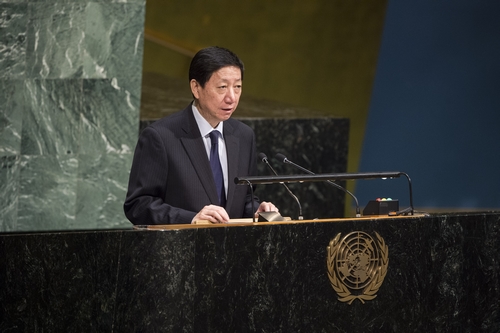| Statement by Ambassador WU Haitao under Agenda Item 77: Oceans and Law of the Sea at the 72nd Session of the General Assembly |
| 2017-12-05 11:35 |
|
Mr. President, The resolutions that we are about to adopt on oceans and the law of the sea and on sustainable fisheries give a fairly comprehensive overview of the relevant work carried out during the past year and, as such, are of great importance to the development of global ocean affairs and the law of the sea. I would like to thank South Africa and Norway for their contribution as facilitators. During the past year, the work of the three major bodies under the United Nations Convention on the Law of the Sea (UNCLOS), i.e. the International Seabed Authority (ISA), the Commission on the Limits of the Continental Shelf (CLCS) and the International Tribunal for the Law of the Sea (ITLOS) continued to produce positive results, which is commendable. I also wish to pay tribute to DOALOS for its hard work as the Secretariat. Mr. President, While new progress has been achieved in the fields of oceans and the law of the sea, there have also emerged new problems and challenges. I would like to share with you China’s positions and proposals in this connection. First, build a community of shared future for mankind and achieve sustainable marine development. As the common home of mankind, oceans represent a valuable space for sustainable development. In June this year, the UN Ocean Conference adopted the declaration “Our Ocean, Our Future: Call for Action” which reiterated support for the implementation of the solemn commitment embodied by SDG 14 of the 2030 Agenda for Sustainable Development. In order to tackle the problems and challenges related to oceans and seas, we must foster a strong sense of a community with a shared future for mankind and work together closely. The Belt and Road Initiative put forward by China, particularly the idea of building the 21st Century Maritime Silk Road, will strongly boost international cooperation in ocean affairs. Under the principle of wide consultation, joint contribution and benefit sharing, China is ready to strive for the establishment of a community of shared future in ocean affairs, strike a balance between protection and sustainable use of the oceans, and promote the implementation of the 2030 Agenda to achieve sustainable marine development. Second, promote maritime rule of law and maintain a fair and reasonable maritime order. The UNCLOS and general international law have provided a legal framework for maritime activities of states. The rights of states within this framework should be fully respected. China supports the role of the ITLOS in peaceful settlement of maritime disputes. As the dispute settlement mechanism provided for in the UNCLOS is a well-designed whole that reflects the concerns of all parties in a balanced manner, the interpretation and application of the mechanism must in be in good-faith and accurate, its integrity must be maintained and its misuse avoided. China supports the CLCS in carrying out its work in accordance with the Convention and the Commission’s current Rules of Procedure, adhering to the principle of not considering and qualifying submissions by any of the States concerned in the dispute, thus to safeguarding the legitimate rights and interests of coastal states as well as the overall interest of the international community, and maintaining a fair and reasonable international maritime order. China supports the ISA in better discharging its duties under the Convention. Third, strengthen communication and coordination to steadily advance the international legislative process in the field of the law of the sea. The negotiations on an international agreement on BBNJ are of great importance to the global maritime governance. With regard to the proposed elements of the draft agreement put forward by the Preparatory Committee, China has noticed that they neither cover all items nor represent consensus among the parties. As such, they have no effect on future positions of negotiating parties. China emphasizes in this connection that the future agreement must not undermine the institutional framework of the UNCLOS, and that relevant arrangements must be based on solid legal and scientific basis and accommodate the interests and concerns of all parties. The Regulations on Exploitation of Mineral Resources in the Area will be important in regulating the exploitation of international seabed mineral resources and the ISA submitted the latest draft in August this year. China stresses that the Regulations must be in line with the provisions and spirit of the UNCLOS and the 1994 Implementing Agreement, aligned with the regulations on exploration of mineral resources in the Area, and commensurate with the current level of human activities in and knowledge of the Area. Relevant work should be carried out gradually based on full consultations among all parties. Mr. President, The Chinese government highly values and actively supports the development of ocean affairs and the law of the sea. In May this year China hosted in Beijing the Belt and Road Forum for International Cooperation, which injected new vitality in efforts to build the 21st Century Maritime Silk Road and carry out ocean-related cooperation. Committed to strengthening capacity building and promoting cooperation, China hosted successively this year China-Small Island Countries’ Ocean Ministerial Round Table and the International Workshop on Marine Debris Management in the Coastal Cities of APEC Region. China will continue to contribute to the voluntary trust funds of the ISA and the CLCS to help developing countries participate in relevant activities. China will, as always, continue to work to maintain international maritime rule of law, build a harmonious maritime order, and promote sustainable marine development. China looks forward to working hand in hand with other countries to respond to ocean-related challenges, protect oceans and seas, and share the fruits of marine development and utilization, all in the Silk Road spirit of peace and cooperation, openness and inclusiveness, mutual learning, and mutually beneficial win-win results. Thank you, Mr. President. |
| |||||||||||||
| |||||||||||||
